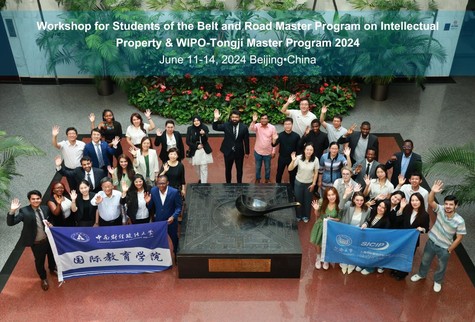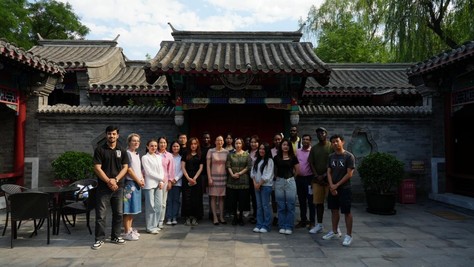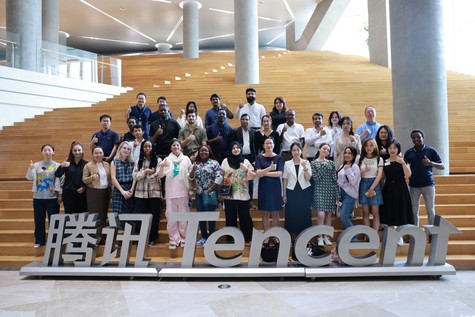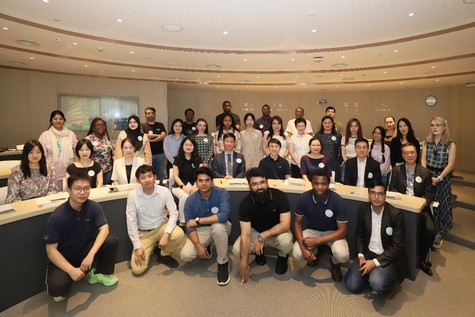

From June 11 to 14, 2024, 17 Chinese and international master's students from the 2023 Belt and Road program and WIPO program visited Beijing to attend a training session organized by the National Intellectual Property Office (NIPO) for the Belt and Road project. The NIPO provided a comprehensive and diverse learning experience with a tight schedule for the students. The students visited the National Intellectual Property Office, Tencent Headquarters, Wanji Technology, and King & Wood Mallesons. In addition, faculty and students also visited the WIPO China Office. The delegation was led by Lin Min, the Deputy Party Chief of the college, Vice Dean Jiang Nan, and class advisor Xu Ming.

At the opening ceremony on June 12, Wang Ying, Deputy Director of the International Cooperation Division of NIPO, delivered a speech emphasizing the global importance of intellectual property protection. She expressed hopes that the students would deepen their understanding of China’s intellectual property system through this visit, strengthening communication and cooperation between Belt and Road countries. Experts from the International Cooperation Division, the Legal Affairs Division, and the Intellectual Property Utilization and Promotion Division shared insights into NIPO’s historical development, organizational structure, the latest practices and policy developments, and China’s intellectual property legal protection and management practices.
The faculty and students visited the business acceptance hall and the intellectual property cultural exhibition hall at the Jimenqiao office area of NIPO. Through these visits, they gained a deeper understanding of the procedures for intellectual property application and protection in China, the achievements of intellectual property development since the 18th National Congress, and the development history of China’s intellectual property system and culture.
On June 14 afternoon, the delegation visited the WIPO China Office. Director Liu Hua warmly welcomed the group and gave an in-depth presentation on the role of innovation in future development. She emphasized the significant value of global intangible assets such as patents, trademarks, copyrights, and industrial designs, which have exceeded $74 trillion, and the importance of building a balanced, effective, dynamic, and future-oriented global intellectual property ecosystem. Liu Hua also introduced the WIPO’s Five Golden Keys—policy platforms, registration systems, databases, cooperation platforms, and capacity building—which empower developing countries and innovative enterprises to increase their competitiveness. She discussed the two major waves of innovation revealed in the 2023 Global Innovation Index: the digital innovation wave based on supercomputing, AI, and automation, and the deep scientific wave based on biotechnology, nanotechnology, and new materials. These innovations are fundamentally changing the future of production, life, and entertainment. She encouraged students to adjust their learning attitudes and career plans accordingly. Furthermore, Liu Hua updated the group on the latest developments in new treaties on intellectual property, genetic resources, and traditional knowledge, and emphasized the importance of encouraging youth and women to showcase their innovations. During the interactive session, Liu Hua shared her views on cutting-edge issues related to artificial intelligence’s impact on intellectual property, such as patentability, copyrightability, and infringement concerns, and answered questions on the transformation of international intellectual property treaties in different countries and the WIPO summer school.

On June 13, faculty and students visited Tencent's Beijing headquarters for a tour and exchange, where they gained a deep understanding of the strategic role intellectual property plays in innovation and development within tech companies. Accompanied by senior patent advisor Xue Feng and patent policy advisor Guo Jing, the group explored Tencent's innovations, from traditional services like WeChat and QQ to emerging technologies such as retinal cameras and autonomous driving systems. They also observed Tencent’s contributions to technology, culture, and social welfare across various sectors. Furthermore, they experienced Tencent’s life-oriented spaces such as the Image store, restaurant, health station, and basketball court, which highlighted the company’s culture of integrity, progress, collaboration, and creativity, as well as its commitment to employee welfare.

The group also visited Wanji Technology, where they were guided by the company's Central Research Institute Director, Deng Yongqiang. Wanji Technology is a national high-tech enterprise focused on the development of intelligent transportation systems (ITS), connected vehicles, big data, cloud platforms, edge computing, and autonomous driving. The visit provided an in-depth look at the company’s achievements in automotive intelligence, networking, and international patent applications.
Following this, the group visited King & Wood Mallesons (KWM) for a thematic exchange. They toured KWM’s office and the King & Wood Mallesons Art Center, which was hosting the Swiss PDW Photography Award exhibition. International partner Zhu Nongfan and lawyers Gao Guozheng and Zhao Jingchuan gave insightful presentations on China’s intellectual property legal system, intellectual property protection, and the latest practices in IP law in China.

Reflections on the Visit
From thematic lectures to on-site visits, this learning journey in Beijing was both engaging and informative. The series of lectures at NIPO provided a deeper understanding of China’s intellectual property legal system and management structure, as well as its achievements in international cooperation. The on-site visits vividly demonstrated how companies use intellectual property to protect innovation and drive technological progress, offering valuable insights into the practical experience of intellectual property practitioners. This visit has given me a deeper understanding of intellectual property protection and the responsibility it entails, which will be a valuable asset in my studies and future career, motivating me to continue growing and progressing in the field of intellectual property.
— Wang Tingxuan, Chinese student, WIPO program
The training sessions organized by the China National Intellectual Property Administration (CNIPA) and Tongji University were meticulously planned and covered a wide range of topics. I had delved into the history and structure of the (CNIPA), gaining insights into its role and responsibilities in protecting intellectual property rights (IPR). The lectures provided a thorough overview of China's IP legislation, including the constitutional provisions, laws, administrative regulations, and the judicial authority of the IP courts.
One of the key learnings from the training was understanding the dual-track system for IP enforcement in China. This system allows IPR holders to seek enforcement through administrative offices or court procedures. This flexibility ensures that IP disputes can be resolved efficiently, with the possibility of appealing to higher courts if necessary. Additionally, I explored various types of IP protections, including patents, geographical indications, copyrights, and trade secrets, and how these are governed under Chinese law.
The sessions also emphasized the practical aspects of IP management, such as the electronic submission of IP registrations and the role of local IP offices in facilitating these processes. I learned about the out-of-court procedures for resolving IP disputes, which offer a faster and less formal alternative to litigation. This aspect of IP management is crucial for maintaining a robust IP protection system and fostering innovation.
——Sey Leaphea,Cambodian students,WIPO program
The workshops offered in this course have been invaluable in deepening my knowledge of intellectual property concepts and practices. From copyright and trademark law to patents and trade secrets, the workshops covered a wide range of topics, providing me with a solid foundation in the fundamentals of intellectual property.
The company visits have been a highlight of the training course, offering a unique opportunity to see intellectual property management in action in real-world settings. Visiting companies that excel in leveraging their intellectual property assets has been inspiring and educational. I have had the chance to witness how companies strategically protect their intellectual property, manage licensing agreements, and enforce their rights to safeguard their innovations and creations. These visits have provided me with a practical understanding of how intellectual property functions within the business environment and have given me valuable insights into best practices that I can apply in my own work.
——Lkhagvasuren Damdinsuren,Mongolian students, Belt and Road program
A visit to VanJee Technology was conducted, a leader in the development of LiDAR technologies that are being utilised in the creation of autonomous vehicle as well as provision of safe transportation system across the world. The company exhibited some of its cutting-edge technologies which are yet to be released on the market, and a brief history from inception 30years and its desire to continue expanding leveraging on IP usage.
A tour of Tencent Holdings, a global tech giant, gave an insight of technologies on the market as well as initiatives taken to reduce environmental pollution through promoting green technologies in their operations. The tour showed how the company is dedicated in providing sustainable environmentally friendly technologies.
——Clarence Takudzwa Mupfurutsa,Zimbabwean students,Belt and Road program
The visit to VanJee Technology provided a glimpse into how technology companies in China are innovating and protecting their IP. As a leader in intelligent transportation solutions, VanJee exemplifies how cutting-edge technology and strong IP strategies can drive industry success.
The visit to Tencent further illustrated the critical role of IP in the tech industry. As one of China’s largest and most influential technology companies, Tencent’s approach to IP management and innovation protection provided us with practical examples of how major corporations navigate the complex landscape of IP law.
——Fatemeh Zahra Talebi,Iranian students, WIPO program






 0086-021-65983113
0086-021-65983113  sicip_intoff@tongji.edu.cn
sicip_intoff@tongji.edu.cn